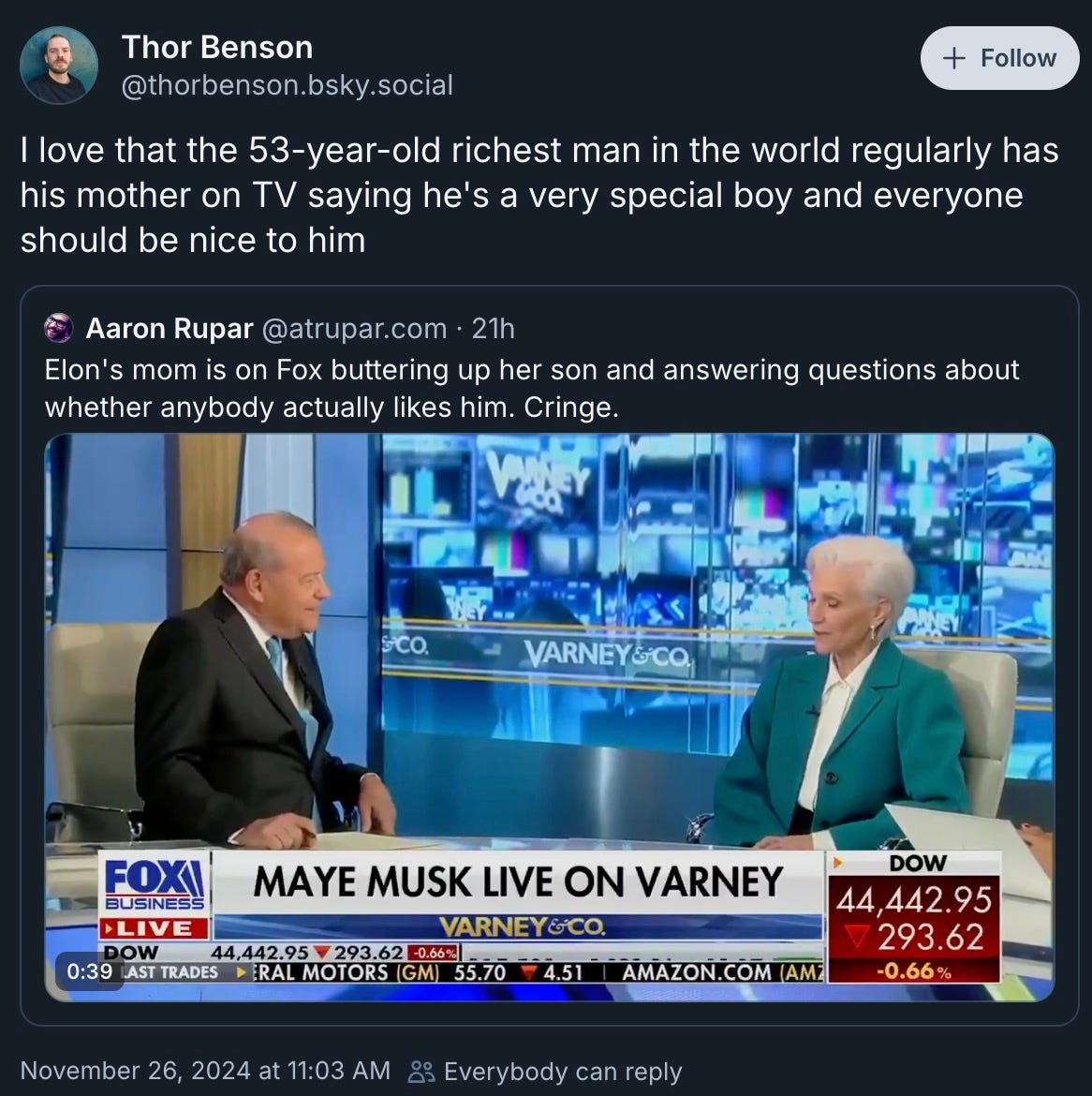The Bootlicker Cabinet
Trump’s outrageously bad nominees draw all the headlines. But the routinely bad ones will do plenty of damage too.
Last Morning Shots of the week—Happy Wednesday, and Happy Thanksgiving! See you all Monday.

They’ll Obey Orders
by William Kristol
Three weeks after his election victory, how is Donald Trump’s administration shaping up?
There’ve been a few spectacularly bad nominees, picked to lead key departments where they would do real and dramatic damage to the nation. One of these, Matt Gaetz, nominated for attorney general, has already withdrawn. The three others—Tulsi Gabbard as director of national intelligence, Pete Hegseth at Defense, and Robert F. Kennedy Jr. at Health and Human Services—should not be confirmed. And who knows—maybe they won’t be.
But the challenge we face over the next four years—and it is a real and difficult challenge—isn’t posed by the spectacularly bad nominees. The challenge is all the routinely bad nominees.
There’s plenty to say against many of these picks. They don’t know much, they’re mediocre, they’re mostly election deniers, and so on. But the core problem is they’re weak. They’ll do what Trump wants, and they’ll do it unquestioningly.
There’ll be no ifs, ands, or buts from this crowd. They’ll be eager to obey and carry out Trump’s orders. And they’ll also hop to it when Trump’s key White House apparatchiks—led by the trio of Vice President JD Vance, Deputy Chief of Staff Stephen Miller, and Office of Management and Budget Director Russell Vought—tell them to do.
These nominees aren’t like some of those who populated Trump’s first term. Jim Mattis, John Kelly, Jeff Sessions, Don McGahn, Gary Cohn, and John Bolton—they all served in the Trump administration. But they didn’t simply think of themselves as serving Trump. They believed they were public servants, there to serve the nation. The men and women of the second Trump administration, by contrast, will see their task as primarily and fundamentally serving Trump.
There’s of course some of this kind of excessive devotion to the president in any administration. But in other administrations, there were important cabinet officials and White House staff who tried to resist being courtiers, who fought against an overly personalized and sometimes blind loyalty to the boss.
But for those serving Trump, Tennyson comes to mind. It will surely be the case that: “Theirs not to make reply. Theirs not to reason why.”
The Trump brigade will consist of good and obedient soldiers.
And it’s worth adding that they’ll be fighting on behalf of goals that will be fundamentally different from those of all recent administrations. If one served George H.W. Bush too blindly and eagerly, one might make policy mistakes. In serving Trump blindly and eagerly, his officials will be serving to advance a deeply authoritarian project.
Trump has moved quickly to put together his cabinet and his team. Presumably he wants everyone to be prepared to deploy in the federal government the authoritarian apparatus and policies that already exist ready at hand.
So Trump and his apparatchiks—minus perhaps the spectacularly bad nominees who get defeated—will be ready to go on January 20.
Will the rest of us be prepared effectively to sound alarms, to use what levers are available to check Trump’s assaults, to organize resistance when possible and where appropriate? That’s surely a task to address after Thanksgiving.
Will the Fighting End in Lebanon?
by Will Selber
The Israel-Hezbollah conflict, which Hezbollah initiated on October 8, 2023, looks to be headed toward a two-month ceasefire. The Israeli government approved the American-negotiated proposal on Tuesday, and President Biden announced that the Lebanese government had also agreed to it, though Hezbollah made no official comment about the deal. The ceasefire went into effect at 4 a.m. local time this morning—9 p.m. last night, for those of us on Eastern Time—and so far appears to be holding, NBC News reports.
This is the closest Hezbollah and Israel have been to a truce since Hamas’s October 7 pogrom. Although Hezbollah and Hamas are part of Iran’s proxy networks, the two groups are distinct. Hezbollah is a Shia group filled with veterans from the conflicts in Iraq and Syria. This week, the Israeli Defense Forces announced they successfully killed Hezbollah leader Ali Musa Daqduq in Syria. In 2007, the United States captured Ali Musa Daqduq, but released him to the Iraqi government during the 2011 withdrawal from Iraq. A few weeks later, the Iraqi government released him to Hezbollah.
Daqduq’s recent demise underscores the IDF’s remarkable campaign against Hezbollah. While the IDF’s war against Hamas grinds on without any substantial progress on a similar ceasefire, the IDF has obliterated Hezbollah’s command structure and made steady gains during their recent incursion into Lebanon.
As always, the devil is in the details. According to local Israeli press reports, the deal will end the fighting in southern Lebanon for two months. During this time, Hezbollah would pull its forces from southern Lebanon back across the Litani River, which is approximately 20 miles from Israel’s northern border. The Lebanese Army, which the Lebanese government nominally controls, would fill Hezbollah’s positions, along with the United Nations Interim Forces in Lebanon.
The structure of the current ceasefire is very similar to the deal that was supposed to end the 2006 Lebanon War. United Nations Resolution 1701, which followed that 34-day conflict, also called for Hezbollah to move its forces behind the Litani River. However, UNIFIL and the Lebanese Army were never able to disarm Hezbollah, and thus the Iran-backed terror group remained, creating tunnel networks that rival Hamas’s.
Israel has stated they will not accept a ceasefire that doesn’t explicitly allow them the freedom to hit Hezbollah if they violate the ceasefire. The Biden administration has tried to ease Israel’s concerns by creating a “side letter” that underscores Israel’s right to act against an “immediate threat.”
Iran still lurks as a possible spoiler. Following the IDF’s successful late-October airstrikes, which crippled Iran’s air defense system and demolished an Iranian nuclear research facility, Iran has promised to retaliate. However, that retaliation may have already come in the form of the recent kidnapping and killing of Rabbi Zvi Kogen in the United Arab Emirates. Israel has accused Iran of being behind the attack. Iran has denied any involvement but has a long history of conducting such plots against Israeli citizens.
Right now, the Israelis have a ceasefire deal with the Lebanese government, which has been more of an observer to the war than a participant in it. Whether Hezbollah will abide by the ceasefire for its duration remains to be seen. Either way, Iran likely won’t.
Quick Hits
MEXICO HITS BACK: Donald Trump pegged his announcement of new 25 percent tariffs against Mexico and Canada this week to drugs and immigrants coming into the United States, accusing our neighbors of not doing enough to stop these problems. Last night, Mexican President Claudia Sheinbaum hit back with a fiery statement noting that America contributes to Mexico’s social problems plenty as well: “Seventy percent of the illegal weapons seized from criminals in Mexico come from your country. We do not produce these weapons, nor do we consume synthetic drugs. Tragically, it is in our country that lives are lost to the violence resulting from meeting the drug demand in yours.”
Migration and drug consumption, Sheinbaum said, “cannot be addressed through threats or tariffs. What is needed is cooperation and mutual understanding to tackle these significant challenges.” But she warned that “for every tariff, there will be a response in kind, until we put at risk our shared enterprises.”
During Trump’s first term, then-Mexican President Andrés Manuel López Obrador managed his relationship with his belligerent counterpart to the north through a “you catch more flies with honey” strategy. Sheinbaum is apparently taking a different approach: one in which she reads U.S. government data back to him.
BE THANKFUL, FOLKS: Be sure to catch Mona’s clear-eyed and lovely Thanksgiving piece, up on the site today:
I personally have not been felled by a dire diagnosis, a bankruptcy, or the untimely death of a loved one. Those are great reasons to be grateful right there. On the other hand, the country has crossed a dangerous threshold with the reelection of Donald Trump and it would be foolish to wave it away. We were already exhausted by eight years of outrages, moral cowardice by those we thought had character, and the steady decline of decency. And now, we must prepare for at least four more years of the same or possibly worse. How can a patriotic American be grateful when the country has elevated this villain to the presidency again? Here are a few things on my list.
SUNSHINE PARTY: Trump may have mopped the floor with Florida Gov. Ron DeSantis in the latest Republican presidential primary, but both men are responsible for turning the one-time swing state of Florida into the epicenter of GOP politics in recent years. NBC News notes that Trump’s incoming administration is lousy with Florida men (and women):
At least five Floridians have been tapped by Trump for prominent jobs, including [Matt] Gaetz and [Pam] Bondi, Sen. Marco Rubio for Secretary of State, Florida Rep. Mike Walz for national security adviser, and former Florida Rep. Dave Weldon to lead the Centers for Disease Control and Prevention.
Some of Trump’s top White House aides are also Floridians. His chief of staff will be Susie Wiles, a longtime Florida operative who led Trump’s first two campaigns in that state, and James Blair, a longtime Wiles deputy, who was tapped to serve as assistant to the president and deputy chief of staff for legislative, political and public affairs.









When the dust settles, what does Trump want to achieve.
Of course the answer is nothing. Still what do Republicans want?
Jonah at the Dispatch thinks if Trump succeeds that the GOP will be the majority party for a long time.
Of course Jonah is a shill for a failed conservatism that imagines President McKinley or Coolidge as ideals. But the voters want birth control, higher minimum wages, universal health care and a host of things that are the norm in peer nations. Even when governed by a conservative party.
So even if Trump “succeeds” - meaning does not force a recession or worse, the voters will continue to flip flop as our ineffective government prevents legislation and when a law is passed, there is a fair chance SCOTUS will scuttle it.
The right really needs to examine policies. Yes sometimes the govt tries too much but if we compare life in places like NJ, CT and CA to AL, MS and LA the differences suggest that higher taxes and higher costs come with prosperity and low taxes and few regs come with oppression and poverty.
I saw a similar story this morning. Encounters between migrants and border officials were down 75% between Dec 23 and Nov 24. Sure would have been nice if the NYT spent as much time focusing on that rather than Biden's debate performance.